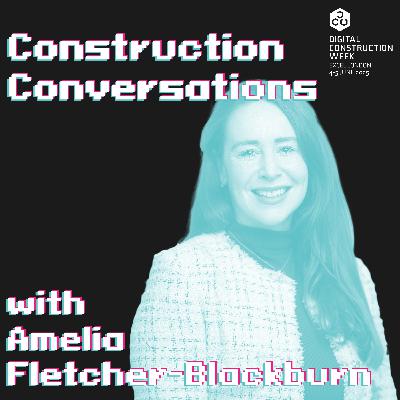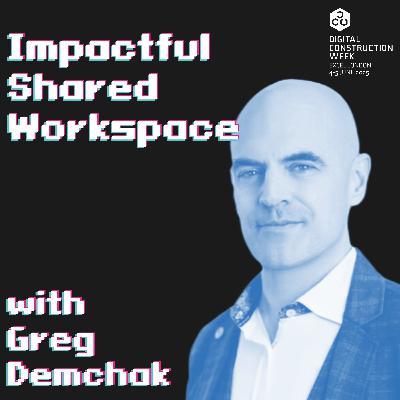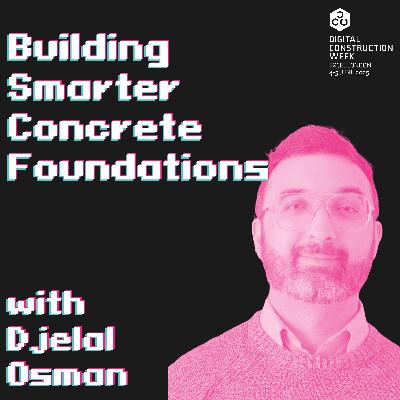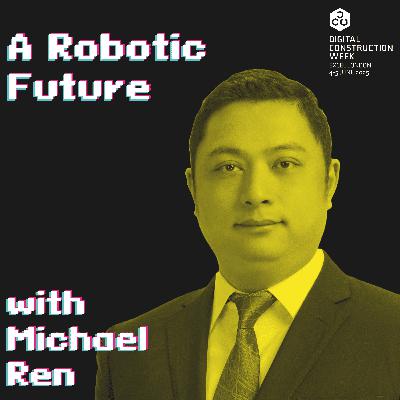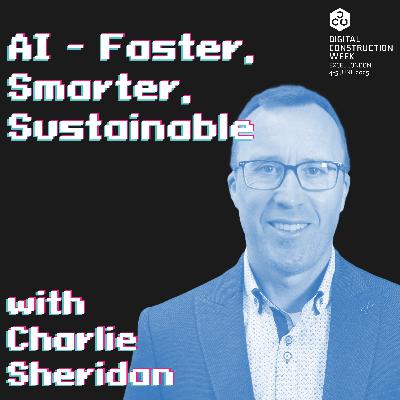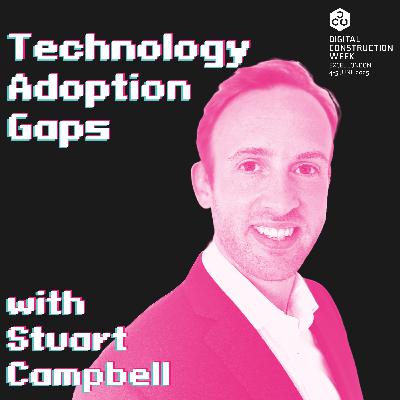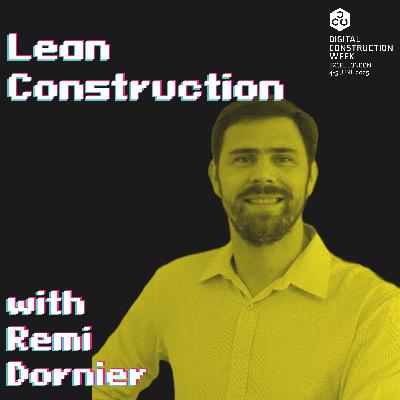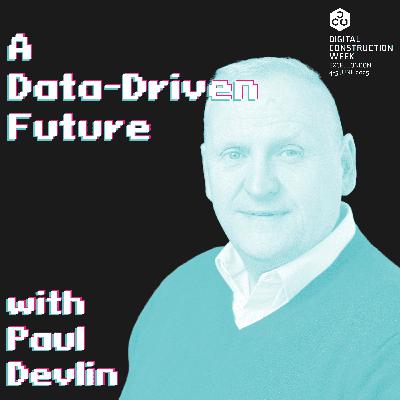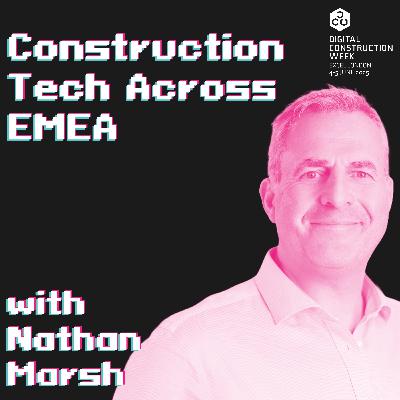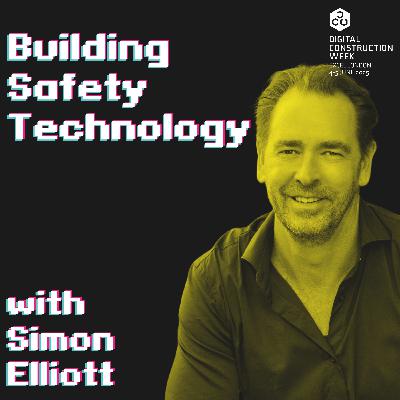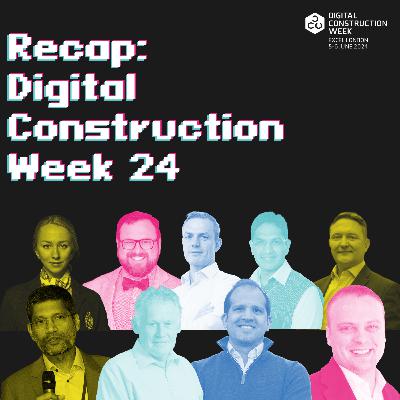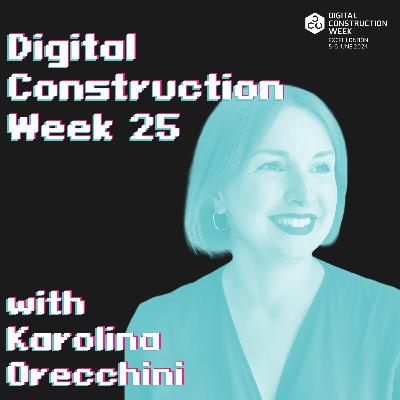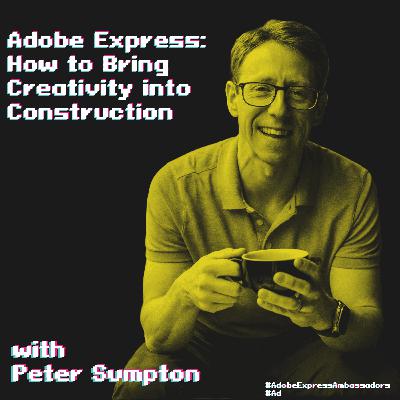Discover Construction Disrupted
Construction Disrupted

Construction Disrupted
Author: Peter Sumpton
Subscribed: 13Played: 144Subscribe
Share
© Copyright 2025 Peter Sumpton
Description
Welcome to Construction Disrupted, the ultimate podcast for the construction industry exploring the limitless possibilities at the dynamic intersection of construction and technology. Delve into the latest topics, news, events, expert insights and marketing that are shaping the industry right now and in the future and hopefully sprinkle a little humour in there.
I’m your guide Peter Sumpton and I run a Marketing Consultancy, buildDifferent. If you're ready to embrace disruption and the unlocked potential building different brings, keep on listening and be part of the conversation that is reshaping the future of construction.
Whether you're a construction technology professional, engineer, architect, contractor, or investor, this podcast is your go-to resource for staying informed, inspired, and connected.
The construction industry has, until recently, been remarkably consistent in its approach. The actual building process has been so consistent that large-scale builds can be traced back to Ancient Egypt, Iraq, Greece, Rome, and China right through to the Industrial Revolution and the large-scale projects we are so used to seeing today.
Raw materials are delivered to Manufacturers who subsequently make the products and components that are required.
Procurement on both sides organises the logistics - distribution to site.
Materials such as bricks, blocks, and timber which in themselves haven’t changed much are brought to the construction site.
Once on-site assembly commences. Contractors and subcontractors (typically) perform the work while inspections from formal bodies, associations and regulators r visit the in-progress building to oversee quality and compliance.
With so many sectors and subsectors along this fragmented supply chain, it’s long been seen as an industry primed for disruption. And now with the added pressures and issues the industry as a whole faces - skill shortages, increasing prices, data overload, waste implications, sustainability factors and tighter regulations, it’s unlikely that any one particular technology will disrupt construction on its own. It will take a collaborative effort across multiple workflows for that to happen.
But what we are seeing now is new techniques and technologies invalidating long-held assumptions about how the construction industry (especially the build) should be done.
A confluence of technologies and tools, including digital twins, building information management (BIM) systems, parametric modelling, smart building materials, sustainable construction practices, robotics, automation, drones, VR, AR, IoT, modular construction, artificial intelligence and many more tech innovations are helping to streamline projects, enhance safety measures and optimise productivity.
Put another way, it’s the technology and exploring the tech-driven transformation of the built environment we must turn to if the construction industry is going to thrive into the future and for now, for many, simply survive!
Thanks so much for taking the time out of your busy day and giving this a read.
I’m your guide Peter Sumpton and I run a Marketing Consultancy, buildDifferent. If you're ready to embrace disruption and the unlocked potential building different brings, keep on listening and be part of the conversation that is reshaping the future of construction.
Whether you're a construction technology professional, engineer, architect, contractor, or investor, this podcast is your go-to resource for staying informed, inspired, and connected.
The construction industry has, until recently, been remarkably consistent in its approach. The actual building process has been so consistent that large-scale builds can be traced back to Ancient Egypt, Iraq, Greece, Rome, and China right through to the Industrial Revolution and the large-scale projects we are so used to seeing today.
Raw materials are delivered to Manufacturers who subsequently make the products and components that are required.
Procurement on both sides organises the logistics - distribution to site.
Materials such as bricks, blocks, and timber which in themselves haven’t changed much are brought to the construction site.
Once on-site assembly commences. Contractors and subcontractors (typically) perform the work while inspections from formal bodies, associations and regulators r visit the in-progress building to oversee quality and compliance.
With so many sectors and subsectors along this fragmented supply chain, it’s long been seen as an industry primed for disruption. And now with the added pressures and issues the industry as a whole faces - skill shortages, increasing prices, data overload, waste implications, sustainability factors and tighter regulations, it’s unlikely that any one particular technology will disrupt construction on its own. It will take a collaborative effort across multiple workflows for that to happen.
But what we are seeing now is new techniques and technologies invalidating long-held assumptions about how the construction industry (especially the build) should be done.
A confluence of technologies and tools, including digital twins, building information management (BIM) systems, parametric modelling, smart building materials, sustainable construction practices, robotics, automation, drones, VR, AR, IoT, modular construction, artificial intelligence and many more tech innovations are helping to streamline projects, enhance safety measures and optimise productivity.
Put another way, it’s the technology and exploring the tech-driven transformation of the built environment we must turn to if the construction industry is going to thrive into the future and for now, for many, simply survive!
Thanks so much for taking the time out of your busy day and giving this a read.
84 Episodes
Reverse
Weather has always been the wildcard on a construction site, derailing schedules, inflating budgets, and adding that factor of risk the taller you build. Yet, for all the talk of digital twins and predictive analytics, weather risk is still too often treated as an unavoidable act of nature rather than a variable that can be measured, priced, and proactively managed.In this episode, we’re exploring why weather is moving from “bad luck” to board-level priority, how climate insight can reshape everything from contracts to profit margins, and what it takes for contractors, insurers, and clients to manage the weather rather than work on a day-to-day basis that brings nothing but unpredictability with someone who knows his nimbostratus from his cumulonimbus.Our guest today is Josh Graham, CEO at EHAB (WeatherWise). Josh leads a platform built specifically for construction to quantify and manage weather risk with science, not guesswork. EHAB’s WeatherWise suite maps portfolio exposure, “digitally rehearses” programmes against likely weather windows, and alerts teams to risks before they bite, saving days of manual analysis and giving planners defensible allowances, plugging into construction planning and risk tools to provide granular, project-level insightJosh is an active voice on weather risk, writing regularly about how data and new insurance models can reduce delays and protect margins as extreme events intensify.Here's our chat in list form- How did WeatherWise come to be?- Why not just check with the Met Office?- Why weather risk is treated as ‘inevitable’, rather than actively managed.- How climate intelligence transforms a business model as well as project delivery.- Building trust in accuracy and forecasting.- Weather prediction myths that are tough to shift.LinksGet Adobe Express for FREE: https://www.adobe.com/uk/express/Website: https://www.builddifferent.marketing/ Linktree: https://linktr.ee/builddifferent
Procurement is where construction’s ambitions meet reality. The point at which programme, cost, risk and quality are either protected or quietly eroded. In a market drenched in price volatility, fragmented supply chains and rising ESG expectations, the old playbook of chasing the lowest number no longer delivers. What matters now is certainty, standardised scopes, transparent comparisons, live market intelligence and disciplined commercial governance that travels from pre-con to handover.Digital procurement is accelerating that shift. The best teams are connecting estimating, tendering and contract execution into a single workflow; capturing supplier performance data; tightening change control; and surfacing risks early enough to act. Done well, it lifts margins, shortens cycles and strengthens relationships with subcontractors, while giving leadership defensible, real-time visibility of where value is being created or lost. Let’s chat to someone who is looking to save 1 billion construction admin hours through procurement tech.Alastair Blenkin is the Founder and CEO of ProcurePro, a construction-tech company transforming procurement for main contractors. Beginning his career as a lawyer on major developments for institutional asset owners, Alastair gained expertise in high-volume contracting, commercial strategy, and risk management.Frustrated by the inefficiencies he encountered, he transitioned into tech to drive meaningful change. Since founding ProcurePro, Alastair has led the company in creating an all-in-one, integrated platform that has powered over 3,500 projects worth more than £38 billion, helping contractors procure 50% faster while saving over hundreds of years of admin time. Alastair’s mission is clear - to save 1 billion construction admin hours and enable the industry to deliver the social infrastructure that supports our lives. Here's our chat in list form- What does value in procurement mean?- Silo’d behaviours of commercial teams in procurement and driving change- Price volatility and labour shortages and the impact on procurement- A lowest-bidder-wins culture, carbon and sustainability. How supply chain transparency can facilitate solving these issues.- AI in procurement: co-pilot or auto-pilot?LinksGet Adobe Express for FREE: https://www.adobe.com/uk/express/Website: https://www.builddifferent.marketing/ Linktree: https://linktr.ee/builddifferent
Quick-Fire questions from Digital Construction Week 2025, providing real insights from the construction tech industry.This is the final episode recorded live at Digital Construction Week 2025.A quick-fire Q&A session that captures the honest, unscripted, and occasionally outstanding responses of industry professionals as they tackle some big questions about the future of digital construction.From AI and robotics to the reality of adoption and the importance of collaboration, these short, insightful pieces highlight what’s top of mind for those building, designing, leading and digitising the built environment.Here are the seven Quick-Fire questions asked of a whole host of delegates attending Digital Construction Week:1 - What do you see as the most exciting development in digital construction right now?2 - What barriers still stand in the way of wider digital adoption across the built environment?3 - What has been the most impactful technology of the last 10 years?4 - Where do you think the biggest wins will come from for construction in the next few years?5 - What challenge will still be holding the industry back a year from now?6 - DCW 2026 - What’s the hot topic, buzzword, we cannot avoid?7 - What’s the one thing people need to be taking away from Digital Construction Week 2025?Some gave sharp insight.Others laughed nervously.And only one person gave the correct answer when asked, "What do you see as the most exciting development in digital construction right now?" The answer: Peter Sumpton - check him out, he's alright.This isn’t a polished highlight reel. It’s a snapshot of how the industry talks when they haven't had time to prepare or provide a scripted answer. Expect thoughtful answers and a few responses that open up the possibilities of what is next for the construction industry.Watch to see who said what, and get a feel for where the momentum really is in digital construction.Show LinksGet Adobe Express for FREE: https://www.adobe.com/uk/express/Website: https://www.builddifferent.marketing/ Linktree: https://linktr.ee/builddifferentDigital Construction LinksDigital Construction Week 25 and 26: https://www.digitalconstructionweek.com/Digital Construction North: https://www.digitalconstructionnorth.com/
As the construction industry continues to grapple with digital transformation, it’s clear that progress is being made, but also that many of the toughest questions still lie ahead. From skills and systems to expectations and execution, the gap between technological potential and everyday practice remains a central challenge.Those leading the charge in digital construction are not only implementing tools but rethinking how the industry works, how knowledge is shared, how platforms connect, and how people adapt to rapid change. Listening to those on the front lines of this evolution offers a unique vantage point: one that blends realism with optimism, and ambition with hard-earned insight.Sometimes it’s as important to take a step back to reflect on what’s been learned so far as it is to take the technological leaps forward and understand where the momentum is heading so that we can build a more connected, digitally confident construction sector, one person, one platform, and one mindset shift at a time. Let’s have a chat with someone who is indeed talking to one person at a time.Amelia Fletcher-Blackburn is an Enterprise Client Partner at Causeway Technologies, where she works with some of the UK’s largest construction and infrastructure organisations to drive meaningful digital transformation. With a strong background in delivering enterprise technology, enabling organisational change and a deep understanding of the built environment, Amelia helps clients navigate complex challenges by aligning digital solutions with business outcomes.Host of the Deconstructing Digital podcast, Amelia speaks with industry leaders, innovators, and change-makers to unpack what digital transformation really means for the construction sector.Amelia is passionate about helping the industry embrace digital change in a way that’s sustainable, scalable, and genuinely useful on the ground.What we cover in this live episode:- Changing how we think about the future of digital construction.- Closing the gaps between technology and the way we work on and off-site.- The evolution of connected platforms and data sharing.- The expectation of future technology enablement.- Advice for those starting out in digital construction.- It’s the 10-year anniversary of DCW. Where will Construction Technology be in a decade?Show LinksGet Adobe Express for FREE: https://www.adobe.com/uk/express/Website: https://www.builddifferent.marketing/ Linktree: https://linktr.ee/builddifferentDigital Construction LinksDigital Construction Week 25 and 26: https://www.digitalconstructionweek.com/Digital Construction North: https://www.digitalconstructionnorth.com/
Digital tools promise faster decisions, smoother collaboration, and greater clarity across construction projects, but the real work often begins after the software is switched on. Yet the adoption of such digital tools isn’t just a technical challenge; it’s a behavioural one.On this podcast, we’re yet to explore the reality of digital transformation on the ground, not from the perspective of dashboards or features, but from the vantage point of the people using them. It’s about time we had a conversation about people, not platforms and the often overlooked human factors that make or break construction technology with someone who knows their behaviours from their bytes. Greg Demchak is a seasoned leader in the architecture, engineering, and construction (AEC) technology sector, recently appointed as Vice President of Industry and Market Development at Motif Systems where He aims to bridge the gap between innovative technology and practical application, ensuring that Motif's next-generation AI-powered solutions are aligned with the evolving needs of design professionals.With over two decades of experience, Greg has been instrumental in pioneering immersive technologies and real-time collaboration tools that have transformed the AEC landscape. His notable contributions include work on foundational platforms like Autodesk Revit and Synchro 4D, as well as leading digital twin initiatives at Bentley Systems. Educated as an architect, Greg holds a Master of Science in Architectural Studies from the Massachusetts Institute of Technology.What we cover in this live episode:- Moving away from fragmented communication methods- Supporting new ways of thinking- What ‘success’ looks like and measuring this success.- False assumptions and surprising realisations.- It’s the 10-year anniversary of DCW. Where will Construction Technology be in a decade?Show LinksGet Adobe Express for FREE: https://www.adobe.com/uk/express/Website: https://www.builddifferent.marketing/ Linktree: https://linktr.ee/builddifferentDigital Construction LinksDigital Construction Week 25 and 26: https://www.digitalconstructionweek.com/Digital Construction North: https://www.digitalconstructionnorth.com/
Concrete forms the literal and figurative foundation of the built environment, yet its role is often overlooked in conversations about innovation. As pressure grows across the construction industry to deliver projects more sustainably and with greater resilience, the systems surrounding this material are beginning to shift.Digitalisation is no longer confined to design software or post-completion analysis. It’s reaching deeper into the materials, methods, and real-time processes that shape how buildings and infrastructure come to life. At the same time, clients and contractors are increasingly looking for smarter, more connected ways to plan, monitor and optimise across the entire project lifecycle. It’s time to cure this conundrum with someone who has solid knowledge in this area (sorry, not sorry for the concrete gags)!Dr Djelal Osman's work is shaped by his extensive experience in both fundamental physics and applied artificial intelligence. Currently an Algorithms Engineer at Converge, he operates at the intersection of technology and sustainability, developing AI and machine learning models to reduce the carbon footprint of the construction sector, focusing particularly on optimising concrete mix designs and usage to minimise embodied carbon. Prior to this role, Djelal co-founded an augmented reality startup, Sention, creating novel computer vision algorithms. His academic foundation includes a PhD in Physics from the Quantum Sensors Group at the University of Cambridge, where his research focused on the physics of low-temperature imaging detectors used in orbital space telescopes.What we cover in this live episode:- Digital tools streamlining the management of concrete- Continually improving sensor technology for concrete monitoring.- How AI is transforming traditional concrete construction practices- The benefits of using data for efficiency and sustainability- Where do you think Construction Technology will be in 10 years?Show LinksGet Adobe Express for FREE: https://www.adobe.com/uk/express/Website: https://www.builddifferent.marketing/ Linktree: https://linktr.ee/builddifferentDigital Construction LinksDigital Construction Week 25 and 26: https://www.digitalconstructionweek.com/Digital Construction North: https://www.digitalconstructionnorth.com/
Robotics are emerging as a powerful tool to improve efficiency, enhance safety, and tackle the growing complexity of modern projects within the built environment. Yet introducing advanced technologies into active, often unpredictable, construction environments brings its own unique set of challenges. From addressing early-stage problems through innovation, to balancing research and development with real-world application, robotics is at a critical point in reshaping the future of the building site. So let’s dive into this topic with someone who lives and breathes robotic engineering.Michael Ren is the Founder and CEO of CSC Robotic Engineering Limited, a pioneering construction robot company established in 2019. Under his visionary leadership, CSC Robo is becoming a global leader in innovative construction technologies.With a career spanning over two decades, Michael is a seasoned technologist and experienced entrepreneur with a proven track record of innovation across multiple industries. His expertise encompasses automation and robotics, power electronics, IoT devices and systems, mechanical and electronic manufacturing, advanced materials research, and micro- and nano-scale fabrication.Michael has held roles as Director of Strategic Application in Shun Cheong Engineering Group, and as an entrepreneur and one of the founders of iLOda, a startup in connected Bluetooth low energy (BLE) wearable products. What we cover in this live episode:- Finding solutions through robotics.- Safety protocols and regulatory frameworks we need to consider.- The best return when using robotics.- Balancing the need for continuous R&D and technological innovations with deploying and delivering on-site robotics.- The building site of the future.- It’s the 10-year anniversary of DCW. Where will Construction Technology be in a decade?Show LinksGet Adobe Express for FREE: https://www.adobe.com/uk/express/Website: https://www.builddifferent.marketing/ Linktree: https://linktr.ee/builddifferentDigital Construction LinksDigital Construction Week 25 and 26: https://www.digitalconstructionweek.com/Digital Construction North: https://www.digitalconstructionnorth.com/
The way organisations manage knowledge, structure delivery, and learn from experience is rapidly changing with the built environment. As projects become more complex and teams more dispersed, traditional approaches to workflows, documentation, and process management are no longer enough. Success increasingly depends on how well teams can capture, share, and evolve their ways of working in real time.At the centre of this shift is a growing demand for tools that are not just digital, but dynamic, tools that support both consistency and adaptability - smarter systems, clearer playbooks, and more human-centric designs that can empower teams to work more effectively, learn faster, and deliver with greater confidence in a fast-changing world, so let’s chat to someone who is leading the charge on this.Pip Morpeth is the CEO of Method Grid and a leading voice in transforming how complex projects are delivered across infrastructure, construction, and professional services. With over 20 years of experience, he helps organisations embed clarity, consistency, and innovation into their ways of working through structured playbooks that integrate knowledge, process, and delivery.Pip’s work combines deep expertise in human psychology, leadership, and change, focusing on what truly drives team performance and sustained transformation. He is a passionate advocate for helping clients move beyond AI as just a nice-to-have feature, supporting teams to scale AI in practical, human-centred ways.What we cover in this live episode:- From static procedures to dynamic, interactive playbooks.- Change management and user adoption challenges when implementing digital tools.- A 'lessons learned' process.- Method Grid and AI- It’s the 10-year anniversary of DCW. Where will Construction Technology be in a decade?Show LinksGet Adobe Express for FREE: https://www.adobe.com/uk/express/Website: https://www.builddifferent.marketing/ Linktree: https://linktr.ee/builddifferentDigital Construction LinksDigital Construction Week 25 and 26: https://www.digitalconstructionweek.com/Digital Construction North: https://www.digitalconstructionnorth.com/
It hasn’t been that long since it was a buzzword we were told we should all be concerned about, as it would soon take our jobs, yet now Artificial Intelligence is no longer a future concept in the built environment, it’s an active force reshaping how buildings are designed, constructed, and maintained. As the AEC/O sector faces growing pressure to deliver faster, smarter and more sustainably, AI is becoming a key enabler of change, offering new possibilities in automation, insight, and decision-making. It’s time to discuss how, with someone who knows…how.Charles Sheridan is the Chief AI and Data Officer and leads the global AI Innovation Hub for Nemetschek, driving the seamless integration of AI technologies across the company’s diverse portfolio of software as well as deploying the internal adoption of AI. Over more than 25 years, Charles has gained international industry experience focused on addressing critical technology challenges in the cyber-physical world. Before joining Nemetschek, he held key roles at large tech companies including Google, Intel and Huawei, where he spearheaded the development of next-generation cloud, AI, data, and IoT solutions.What we cover in this live episode:- Using Nemetschek’s AI Innovation Hub as an accelerator for digital transformation across the AEC/O industry.- The integration of AI into the building lifecycle to enhance creativity, efficiency and user experience.- Addressing ethical considerations and ensuring responsible AI deployment.- AI Assistants' ability to reshape collaboration, decision-making and workflow management.- It’s the 10-year anniversary of DCW. Where will Construction Technology be in a decade?Show LinksGet Adobe Express for FREE: https://www.adobe.com/uk/express/Website: https://www.builddifferent.marketing/ Linktree: https://linktr.ee/builddifferentDigital Construction LinksDigital Construction Week 25 and 26: https://www.digitalconstructionweek.com/Digital Construction North: https://www.digitalconstructionnorth.com/
The construction industry stands at a critical crossroads. With mounting pressure to deliver projects faster, safer, and more sustainably, the role of technology is no longer a matter of future potential; it’s a present-day necessity. From automation and data-driven design to machine control and connected workflows, digital innovation challenges long-standing assumptions about what’s possible on and off the jobsite and while AI, BIM, and other innovations continue to grow in popularity across the industry, many organisations still struggle with a lack of digital skills and preceieved high implementation cost which usually come due to tech interoperability issues. It’s a triple whammy!So, for transformation on an industry scale to become a reality, we have to answer some really difficult questions: How do we balance the speed of innovation with a resilience to develop the skills needed to benefit, and can we meaningfully reduce inefficiencies without increasing complexity?How are the digital and physical worlds converging in construction, and what does it take to lead the charge through that shift with clarity, purpose, and impact? Stuart Campbell is the Senior Manager for Trimble in UK & Ireland. He is responsible for managing the team that promotes the Trimble AECO software portfolio within some of the largest main contractors, housebuilders, specialist subcontractors and engineering consultancies and in his spare time, Stuart is studying for an MBA at Alliance Manchester Business School.What we cover in this live episode:- Overestimating the pace of innovation and underestimating the depth of skills needed - The responsibility enterprises have within the industry- The risks of over-digitising- It’s the 10-year anniversary of DCW. Where will Construction Technology be in a decade?Show LinksGet Adobe Express for FREE: https://www.adobe.com/uk/express/Website: https://www.builddifferent.marketing/ Linktree: https://linktr.ee/builddifferentDigital Construction LinksDigital Construction Week 25 and 26: https://www.digitalconstructionweek.com/Digital Construction North: https://www.digitalconstructionnorth.com/
Digital innovation is driving profound changes across the construction sector, offering new ways to rethink how buildings and infrastructure are conceived, delivered and operated. From the emergence of advanced modelling technologies to the application of artificial intelligence and manufacturing principles, the industry is moving towards a more connected, efficient and sustainable future. We know all this, but when it comes to lean construction, it can get a little confusing as construction in itself is anything but lean. We need to chat to someone who can help us lean into this topic and shed some light on its importance.With 16 years of experience in Dassault Systèmes, Remi Dornier has been committed to his passion of deep interest in Geosciences, Architecture Engineering and Construction (AEC) sciences and technology. Working in close collaboration with industry, research institutions, and governments he focused on leading business transformation in Aerospace, Naval, Industrial Equipment and AEC industries in both mature and emerging markets with 7 years in France and 8 years in Asia. What we cover in this live episode:- The journey of Lean Construction over the past three decades and its fundamentals.- Addressing the three big challenges: environmental, economic, and human.- Exploring the five principles: Focus on goals, Communicate visually, Obsess over the plan, Notice flow, Understand the human element.- Overcoming cultural and systemic barriers to lean adoption.- The emergence of AI and how this may shape or define the future of lean construction.- It’s the 10-year anniversary of DCW. Where will Construction Technology be in a decade?Show LinksGet Adobe Express for FREE: https://www.adobe.com/uk/express/Website: https://www.builddifferent.marketing/ Linktree: https://linktr.ee/builddifferentDigital Construction LinksDigital Construction Week 25 and 26: https://www.digitalconstructionweek.com/Digital Construction North: https://www.digitalconstructionnorth.com/
Driven by the need to enhance efficiency, reduce waste, and improve collaboration, digital solutions are at the forefront of the changes within the built environment, offering tools that streamline processes and connect various stakeholders across the construction lifecycle.However, digitalisation is not simply a matter of implementing new technologies, it demands a shift in mindset, culture, and operational practice. As projects grow more complex and pressures on time, cost, and sustainability increase, the industry must rethink how information flows, how teams collaborate, and how value is created at every stage of the supply chain.From real-time data integration to predictive analytics and a connected supply chain, technology is redefining what is possible but also reshaping the expectations of clients, contractors, and the wider built environment community. The importance of this cannot be understated, so we need to chat to someone who is at the top of supply chain technologies that are facilitating a more connected industry.Paul Devlin, CEO of Causeway Technologies, is an industry veteran with over 25 years of experience in sales and consulting, holding executive leadership positions with leading global companies, including SUSE, SAP, SAS, and Teradata.Paul is a passionate advocate for lifelong learning, having begun his career as a plumber before moving into the world of business. He is often sought out within the Industry for his thought leadership and experience in leading sales force transformations in high-growth environments.Paul graduated in 2016 with a Masters in Leading Sales Transformation from Middlesex University and holds advanced leadership certification from Cranfield University in the UK and the Centre for Creative Leadership in the United States.What we cover in this live episode:- Has digital transformation in construction been too slow?- The cost of doing nothing.- What’s stopping us from joining the dots between data, technology and people? - Is it time to take more risks with technology?- It’s the 10-year anniversary of DCW. Where will Construction Technology be in a decade?Show LinksGet Adobe Express for FREE: https://www.adobe.com/uk/express/Website: https://www.builddifferent.marketing/ Linktree: https://linktr.ee/builddifferentDigital Construction LinksDigital Construction Week 25 and 26: https://www.digitalconstructionweek.com/Digital Construction North: https://www.digitalconstructionnorth.com/
Augmented Reality (AR) is becoming an increasingly valuable tool in the construction sector, offering new ways to bridge the gap between digital plans and physical sites. We’ve covered this topic already way back in episode 9 - Can AR be a True Reality? where founders of Gamma AR - Caner Dolas & Jayan Jevanesan were kind enough to open up about the benefits of AR within the built environment, and since then the use of this tech has simply intensified as the industry looks for solutions that improve accuracy, collaboration, and efficiency.AR is moving from an emerging technology to a practical asset with a clear business case. Beyond immediate project benefits, there is also growing interest in how AR can support skills development and attract the next generation of construction professionals, so let’s chat to someone from a familiar organisation shall we?I’m delighted to welcome Alexander Sidorov, the COO / CFO of GAMMA Technologies, a colleague of Caner and Jayan, who I mentioned earlier, and the company behind GAMMA AR. He drives the Company’s Strategy and Operations and has 10 years of experience in corporate finance and venture building across various industries, including construction-related and technology-oriented projects. He also contributes to business development efforts of GAMMA Technologies across several geographies, including the UK and is obsessed with best practices and efficient deployment of field-based ConTech solutions.What we cover in this live episode:- The business case for adopting AR technology.- Lightbulb moments when using AR.- GAMMA ARs evolution to stay ahead.- Attracting the next generation of construction workers.- It’s the 10-year anniversary of DCW. Where will Construction Technology be in a decade?Show LinksGet Adobe Express for FREE: https://www.adobe.com/uk/express/Website: https://www.builddifferent.marketing/ Linktree: https://linktr.ee/builddifferentDigital Construction LinksDigital Construction Week 25 and 26: https://www.digitalconstructionweek.com/Digital Construction North: https://www.digitalconstructionnorth.com/
As infrastructure demands grow across Europe, the Middle East and Africa, so too does the complexity of delivering them. From transport and utilities to large-scale urban development, the sector must respond not only to technical challenges but also to regional variation in policy, regulation, skills, and economic conditions.Digital tools and smarter processes are central to addressing this complexity, helping organisations plan more effectively, operate more sustainably, and build with greater precision. Yet transformation at this scale also depends on something less tangible: the ability to adapt ways of working, develop new capabilities, and navigate the gaps between vision and implementation.With this in mind, let’s chat to someone who is leading the charge on this.Nathan Marsh is the Regional Executive for EMEA at Bentley Systems. As the senior leader in the region, he is responsible for the strategy, growth, and success of the EMEA business. He has over 20 years of leadership roles within management consultancy, risk advisory, private equity and corporate finance, engineering, and construction businesses, all focused on the funding, design, delivery, and operation of complex and critical national infrastructure.Prior to joining Bentley, Nathan served as Chief Digital Officer for FTSE and SEC listed construction businesses, leading the deployment of digital solutions into major infrastructure programmes to create value, reduce risk and improve performance. Nathan has also served as a British army officer, played professional rugby and is privileged to represent industry on a range of expert panels, advisory boards and committees.What we cover in this live episode:- Reshaping the way infrastructure assets are designed, built, and managed.- The key challenges in implementing tech across varied built environments and economies.- Growth opportunities from a regional perspective and the tech that will support this growth.- A shifting skills profile within construction.- It’s the 10-year anniversary of DCW. Where will Construction Technology be in a decade?Show LinksGet Adobe Express for FREE: https://www.adobe.com/uk/express/Website: https://www.builddifferent.marketing/ Linktree: https://linktr.ee/builddifferentDigital Construction LinksDigital Construction Week 25 and 26: https://www.digitalconstructionweek.com/Digital Construction North: https://www.digitalconstructionnorth.com/
The construction site is one of the most dynamic, high-stakes environments in the modern economy, yet it's also one of the least digitally connected. As the industry grapples with increasing pressure around safety, compliance, and labour shortages, the gap between digital intent and on-the-ground reality remains stubbornly wide.For technology to genuinely improve how people work on-site, it needs to do more than just monitor or automate. It must support real communication, foster trust, and make safety and efficiency part of the culture, not just the paperwork.From workforce empowerment to ethical accountability, this is a chance to look at construction technology not just as systems of data, but as systems of people with someone who is building systems for people.Simon Elliott is the CEO of 1Breadcrumb, a construction technology company helping contractors digitise and streamline safety and compliance on-site. Established across Australia and the UK, and is now expanding into North America, 1Breadcrumb empowers frontline workers through its intuitive technology. Simon brings over 20 years of experience in digital transformation, with roles across the Health, Government, and Construction Technology sectors. He has founded companies, led M&A transactions, overseen international expansions, and guided businesses through venture funding and strategic growth.Today, Simon leads the business through its next phase of global scale, while staying grounded in a mission to make safety and compliance simple, embedded, and worker-friendly.What we cover in this live episode:- Designing tech that workers want to use.- Shifting from viewing safety as a checklist to embedding it into the organisational culture.- Maintaining a high level of compliance.- Supporting a culture of accountability, not creating suspicion.- It’s the 10-year anniversary of DCW. Where will Construction Technology be in a decade?Show LinksGet Adobe Express for FREE: https://www.adobe.com/uk/express/Website: https://www.builddifferent.marketing/ Linktree: https://linktr.ee/builddifferentDigital Construction LinksDigital Construction Week 25 and 26: https://www.digitalconstructionweek.com/Digital Construction North: https://www.digitalconstructionnorth.com/
Been a little quiet on releasing episodes recently as I'm back doing some more live podcasting at Digital Construction Week 2025. Following this episode, I'll have some recordings live from DCW to share with you, so if you haven't already, subscribe and you won't miss a thing.And that is what they call a seamless segway, because if you missed out on last year's recordings, you're in for a treat. In this weeks special episode we're revisiting the dynamic conversations recorded live at Digital Construction Week (DCW) 2024.As the construction industry continues to innovation at a faster and faster pace, DCW 2024 provided the perfect platform for thought leaders to share insights on the digital transformation shaping our built environment.These conversations underscore the industry's commitment to embracing digital transformation. As we reflect on just some of the insights each episode provided, it's clear that the integration of technology in construction is an evolution for efficiency, collaboration and innovation.Here are some of the highlights We'll dive into from Digital Construction Week 2024;Digital Adoption with Ben Huskisson (Gleeds): Ben delved into the challenges and opportunities of integrating digital tools within construction workflows, emphasising the importance of cultural change alongside technological advancement.Digital Transformations with Kris Lengieza (ProCore): Kris shared his experiences on driving digital change, highlighting strategies for effective implementation and the role of leadership in integrating innovation. Site Efficiency and Management with Roger Bradbury (Chime): Roger discussed practical approaches to enhancing on-site efficiency through digital solutions, focusing on real-time data and resource management. Project Management and Objective Data with Andy Steele (Buildots): Andy explored the integration of objective data in project management, illustrating how data-driven decisions can lead to improved project outcomes. Cloud Construction Technology with Kristina Poluyanova (AutoDesk): Kristina examined the impact of cloud technologies on construction processes, discussing scalability, collaboration, and data accessibility. Streamlining Processes with José Oliveira (DiRoots): José highlighted methods to streamline construction processes, focusing on efficiency gains through digital tools and process optimisation.Machine Learning with Varun Bhartiya (nCircle): Varun introduced applications of machine learning in construction, demonstrating how predictive analytics can enhance decision-making and project planning. Supply Chain Transformations with Neeral Shah (YardLink): Neeral discussed the digitisation of the construction supply chain, addressing challenges and showcasing solutions for improved transparency and efficiency.Digital Twins with Anand Mecheri (Twinit): Anand explored the concept of digital twins, explaining their role in simulating and managing built environments for better performance and sustainability.LinksGet Adobe Express for FREE: https://www.adobe.com/uk/express/Website: https://www.builddifferent.marketing/ Linktree: https://linktr.ee/builddifferent
Digital transformation in the built environment is no longer a future ambition, it’s a present-day reality reshaping how we design, deliver, and manage our physical world. From automation and data-driven decision making to the pursuit of more sustainable, efficient and connected projects, it’s here, it’s now. But how do we know what the right here and now is for our own organisations, chasing the same efficiencies but with specific needs?As the UK’s leading event dedicated to innovation in the built environment, Digital Construction Week (allbeit not a week) offers a valuable lens on the organisations, technologies, ideas and conversations shaping this transformation. Now in its tenth year, the show brings together thousands of professionals from across architecture, engineering, construction and operations for two days (again, not a week) of discovery, learning and collaboration.But what can we expect from this year’s, erm, week? From standout sessions and emerging technologies. The ‘week’ reflects the evolving needs of the industry, the role it plays in helping professionals make sense of complex trends, as well as the required critical decision-making of what tech is right for their organisation. So let’s chat to someone who knows the answer to these questions better than most.Karolina Orecchini is the Event Director of Digital Construction Week (DCW), the UK’s leading event for innovation and technology in the built environment. With over five years dedicated to DCW, Karolina has helped shape the show into a dynamic platform for professionals driving digital change across architecture, engineering, construction, and operations.With a background that spans various industries such as beauty and football, Karolina has built a career on delivering impactful events. While the sectors may have changed, a deep passion for bringing people together remained constant.We're taking a look at:- The evolution of Digital Construction Week (10 years on)- What should people expect this year- Where should people be heading on the day?- What goes into building an event like DCW?- Balancing hot topics with ever-present ones such as Digital Twins, BIM and ERPs- Emerging technologies and under-discussed ideas- What do you want people to take away from this year's event?LinksAdobe Express 30-day Free Trial: https://prf.hn/l/ZYdd028 Website: https://www.builddifferent.marketing/ Linktree: https://linktr.ee/builddifferentFurther Linkshttps://www.digitalconstructionweek.com/Register here: https://eventdata.uk/Forms/Form.aspx?FormRef=DCW65Visitor
Anyone can be creative, and anything can be creative. But what transforms something creative into something useful in a business-to-business environment is how it engages an audience. Does it resonate? Is it memorable, functional, and appropriate for the intended channel? And that's just for starters. Using the right creative technology is crucial in a world where the dynamics of creative design execution – be it image, video, audio, or the written word – change almost daily.In today’s episode, we're discussing why creative technology, specifically Adobe Express, should be a central part of every UK construction company’s toolkit. Communicating clearly, consistently, and professionally is paramount, whether it's winning bids, managing client expectations, becoming memorable, creating brand salience, or effectively collaborating with suppliers and internal teams. Having the right technology to streamline and enhance content creation can set your business apart.Adobe Express simplifies complex content production tasks that typically require significant resources or specialist skills. From quick-turnaround tender documents and impactful marketing materials to internal training resources, supplier communications, and collaborations, Adobe Express empowers teams of any size to deliver exceptional quality efficiently, cost-effectively, and most importantly, consistently, thanks to its clever product design, intuitive interface, and tools that enhance rather than hinder the creative process.Allow me to take you through my top five capabilities that Adobe Express has to offer and explore how each can specifically benefit organisations within the UK construction industry or, indeed any organisation with a B2B focus. These capabilities are not just for enhancing marketing; they also support sales, HR, procurement, customer service, product development, HSE, technical, and supplier engagements.Imagine this scenario:- Someone has created complex designs in Illustrator and/or Photoshop.- These designs can be imported seamlessly into Adobe Express, where you need to remove some graphics that aren't relevant.- You use the Generative AI ‘Remove Objects’ feature to update the design and subsequently apply the correct branding seamlessly.- This design needs to be used in four different tenders, requiring multiple resizes.- This can be done with just a few clicks in Adobe Express.- You decide that, with a few tweaks and using various parts of the design, it would create excellent content showcasing the best your organisation has to offer.- You schedule multiple posts, even using AI to write intuitive and engaging copy tailored to each communication platform, and with just a click, you have a week's worth of content from a single image.Top five B2B creative capabilities from Adobe Express- Staying in sync with your favorite apps- Commercially safe generative AI- Brands & Apply Brand- Complex edits in a single click- Content SchedulerLinksTry out Adobe Express at adobe.com/express and then let me know below what YOU love about it!Website: https://www.builddifferent.marketing/ Linktree: https://linktr.ee/builddifferent#AdobeExpressAmbassadors #Ad #ChooseAdobeExpress
We know the construction industry is evolving at an incredible pace, I start most episodes by saying so, a scene setting if you like, and with it, the way companies market themselves is changing too. From digital transformation to shifting buyer behaviours, marketing teams are constantly adapting to new challenges and opportunities. But with so much data, technology, and strategy at play, what really matters when it comes to effective construction marketing?In this episode, we take a deep dive into the latest trends, challenges, and insights shaping the industry from the people in the know, those pesky marketers. We’ll be exploring findings from the latest research curated by the SLG Agency in their annual Horizon Report (link in the show notes - obvs), uncovering what’s changed over the past year, and discussing the real impact of key marketing activities. From AI and personalisation to the role of brand awareness, we’ll be cutting through the noise to understand what’s driving success, and what might just be a distraction. So, whether you’re a marketer, business leader, or simply curious about the future of construction marketing, this episode is packed with valuable insights you won’t want to miss and who better to lead us through this than someone familiar to the podcast.Today we welcome BACK Ryan Jones, Managing Director at SLG. Ryan has 20-years of experience managing communications for some of the construction sector’s biggest names, building up a wealth of strategic marketing experience.Under Ryan’s leadership, SLG has won multiple awards for its impactful campaigns, proving that marketing can do more than just promote, it can shape industries.Here are the marketing insights we chat about- Introduction to the Horizon report- What’s changed since last years report- Why brand awareness is a main activity… but not a key metric?- A focus on MQLs and… web traffic?- Campaign volume down and why this is a good thing- Content is 'the internal’ King, but strategy isn't- AI and personalisation are hot topics (but so is podcasting)- Is AI suffering from 'new shiny toys syndrome' as sustainability becomes unsustainableLinksAdobe Express 30-day Free Trial: https://prf.hn/l/ZYdd028 Website: https://www.builddifferent.marketing/ Linktree: https://linktr.ee/builddifferentFurther Linkshttps://www.slg.agency/horizon-2025/
Today’s episode is slightly different from our usual format, we’re bringing you a special recording of a webinar I hosted with Causeway Technology, featuring Philip King - more on Philip later.In this session, we dive into the Fair Payment Code, a crucial topic for the construction industry. Late payments have long been a challenge in the sector, and ensuring fair, transparent, and timely payments is more important than ever. But here’s the thing, compliance with the code isn’t just about policy and best practice. Technology plays a huge role in making fair payment a reality, streamlining processes, and ensuring businesses get paid on time.Let’s get into it!Late payments have been a persistent issue in the UK construction industry, creating cash flow problems, delaying projects, and putting undue pressure on suppliers. With increasing scrutiny on payment practices, the introduction of the Fair Payment Code (FPC) is designed to drive positive change, promoting transparency, accountability, and efficiency across supply chains.But what does the Fair Payment Code mean in practice? How can construction firms ensure compliance, and what are the benefits of achieving a Fair Payment Code Award?We’re joined by Philip King, former CEO of the Chartered Institute of Credit Management and Causeway Cashflow Consultant, to explore the ins and outs of the Fair Payment Code. We’ll break down how the framework works, what businesses need to do to meet the criteria, and the competitive advantages that come with compliance.Here's what you need to know and will find out in this episode:- From Prompt Payment to Fair Payment – How does the FPC differ, and why was it introduced?- The Awarding Levels Explained – What do Bronze, Silver, and Gold accreditation mean for your business?- The Road to Compliance – What documentation and processes are required to apply?- Clear, Fair & Collaborative – The three core principles and how they are measured.- Overcoming Barriers – Common challenges in achieving FPC status and how to tackle them.LinksAdobe Express 30-day Free Trial: https://prf.hn/l/ZYdd028 Website: https://www.builddifferent.marketing/ Linktree: https://linktr.ee/builddifferentFurther Linkshttps://www.smallbusinesscommissioner.gov.uk/fpc/Webinar Video: https://campaign.causeway.com/ondemand/fair-payment-code-fpc





